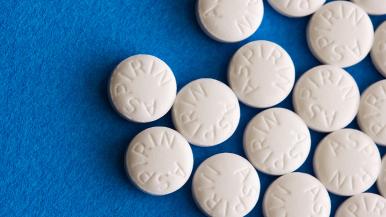At one point some believed that low-dose aspirin could help prevent a stroke or a blood clot.
In fact, if you’re a healthy older adult, taking low-dose aspirin won’t prevent a stroke but instead it may make it far worse if you have one, according to new research published in JAMA.
“In this study, we found that aspirin could be harmful and could put a healthy older adult at risk for other types of strokes, including bleeding strokes,” said Raj C. Shah, MD, a professor of family and preventive medicine with the RUSH Alzheimer’s Disease Center.
The results showed that aspirin did not prevent clots that form in the brain that cause thrombotic or embolic strokes.
“The results will have a significant impact on guidelines about aspirin use for prevention and in daily clinical conversations between physicians and their older, healthy patients regarding whether aspirin should or should not be used for stroke prevention,” Shah said.
The study is a secondary analysis of a large clinical trial called “Aspirin in Reducing Events in the Elderly,” which aimed to determine the risks and benefits of daily low-dose aspirin in healthy older adults without previous cardiovascular events, dementia or physical disability, and who were free of medical conditions requiring aspirin use. The ASPREE clinical trial took place in the United States and Australia from 2010 through 2014.
Shah served as principal investigator of the ASPREE trial at RUSH, which was an enrollment site for the study through the patient-oriented research team of the RUSH Alzheimer’s Disease Center. Shah also served on the study’s International Steering Committee and as co-U.S. investigator with Anne Murray, MD, at the Berman Center in Minneapolis, Minnesota.
“This work is a key milestone in the more than a decade-long engagement in this large-scale clinical trial in the United States and Australia,” Shah said.
Aspirin was associated with greater risk of bleeding
The randomized, double-blind, placebo-controlled trial enrolled 19,114 older people (16,703 in Australia and 2,411 in the United States). Study participants were enrolled at age 70 or older, with 65 as the minimum age of entry and followed for an average of 4.7 years to determine outcomes. A total of 9,525 people were given aspirin and 9,589 a placebo.
Investigators measured for bleeding — a known risk of regular aspirin use — and found that aspirin was associated with a significantly increased risk of bleeding.
“There are 25 among the 1,000 individuals per year of follow-up taking the low-dose aspirin compared with 18 cases of brain bleeds per 1000 person-years of follow-up in individuals taking placebo,” Shah said. “The risk for a brain bleed is higher than the benefit of fewer thrombotic/embolic strokes in healthy older adults.”
Findings do not apply to patients with cardiovascular conditions
“This study showed that low-dose aspirin has no role for primary prevention of stroke in older healthy adults who had no prior history of cardiovascular disease,” Shah said. “Caution should be taken with the use of aspirin and older persons prone to head trauma since taking aspirin puts a person at an increased risk of bleeding in the brain.”
“It’s important that older adults should consult their doctor before beginning or stopping a specific drug regimen because if you're a healthy senior, aspirin's probably not one of the things you want to put in your regimen since there's a bit more risk than potential for benefit.”
The primary author of the study was Dr. Geoffrey C. Donnan at Monash University. The team of scientists involved on ASPREE was led by Murray and John J. McNeil, MBBS, PhD, head of the Department of Epidemiology and Preventive Health at Monash University, Melbourne, Australia.
The research was supported in part by the National Institute on Aging and the National Cancer Institute, both parts of the National Institutes of Health (U01AG029824). The Australian component of the study also received funding from the Australian National Health and Medical Research Council and Monash University. Aspirin and placebo were supplied by Bayer, which had no other involvement with the study.



